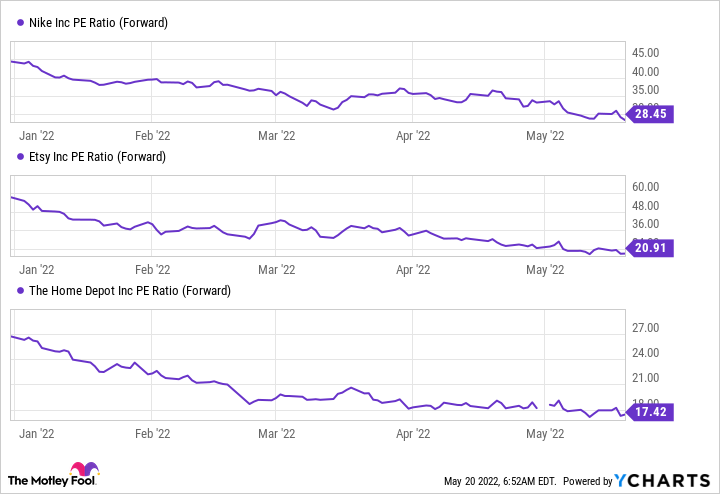Right now, one look at stock indexes may be enough to keep you up at night. The S&P 500 Index recorded its worst performance in two years on Wednesday. And the S&P 500, the Dow Jones Industrial Average, and the Nasdaq each slid 3.05%, 2.9%, and 3.82%, respectively, this week.
It's completely normal to get a little jittery at times like these. But before you consider selling your worst performers or vow to never buy another stock again -- wait. There are actually five good reasons why today's market turmoil shouldn't shake you.

Image source: Getty Images.
1. Today's losses are driven by temporary, external factors
One of investors' biggest worries today is high inflation -- and the idea that increases in interest rates to calm inflation could lead to a recession. Today, rising inflation is proving to be especially tough for retailers. Big names such as Target (TGT -0.70%), Amazon, and Walmart are struggling with higher prices. And in many cases, there's only so much they're willing to pass on to the consumer. For example, in this week's earnings report, Target said: "Even as we face multiple cost pressures, our team is working tirelessly to maintain prices wherever possible."
Shares of these companies have dropped as rising inflation weighs on earnings. And the general environment of inflation and rate hike worries has brought down the general market.
But here's the good news. High inflation and economic woes are temporary problems. And they are external ones. This is something companies are dealing with now. But these issues won't last forever. And, being external, they don't reflect a weakness in a company's business. This brings me to my next point...
2. Some of the biggest decliners still have strong businesses
As mentioned above, companies are facing higher costs now. And companies in certain sectors like consumer goods are also suffering because shoppers are spending less. The consumer, too, is feeling the effect of inflation.
These elements are painful in the short term. But here's a reason to be positive: They don't change long-term prospects of certain businesses. I'll use Target as an example again. Today, Target shoppers are going for essentials instead of higher-margin items like apparel. But the key point is that they are still shopping at Target.
In medical devices, Stryker Corp. expects inflationary pressure due to raw material shortages to linger all year. But in the fourth-quarter earnings call, Stryker said: "We believe that the underlying demand for our products remains strong."
Companies with strong infrastructure, cash levels to get them through difficult times, and customers to buy their products in the future will eventually recover.
3. Today's declines create buying opportunities
Many strong companies have seen their shares fall in recent weeks. These include companies that have seen a dip in earnings as well as those that continue to deliver strong growth. And that means their prices in relation to forward earnings estimates have dropped too. This is particularly the case in the world of consumer goods. Examples include Nike, Etsy, and Home Depot.

NKE PE Ratio (Forward) data by YCharts
And that equals a buying opportunity. A company with a strong earnings track record and bright future prospects is likely to win over the long term. For those struggling right now due to inflation, earnings and share price should recover once today's external problems subside. That means now is the time to go shopping for those types of players. The idea is to buy and hold on for at least five years to benefit from a rebound and additional growth.
4. You haven't lost if you haven't sold
If you study your portfolio today, you might be more than a little worried. You might even say something like, "Oh, no! I've lost X% of my investment." But always remember: You haven't lost if you haven't sold.
Market downturns are the worst possible time to sell. In these difficult moments, it's crucial to remain calm, think of the reasons you invested in the particular stocks in your portfolio, and remind yourself that those elements probably haven't changed. If a company is a market leader or has a solid relationship with customers, external pressures today won't change that. Right now, the best thing to do is hold on to those companies you believe in.
5. The stock market always recovers
It's important to keep in mind that you might not win with every stock in your portfolio. This is the case whether the market is soaring or plummeting. Investing always involves a certain amount of risk. That's why it's a good idea to diversify across industries -- and, over time, build out your portfolio to include at least 25 different stocks. This reduces your dependence on just a few players -- and therefore, lowers risk.
Overall, investing in strong companies that have proven themselves usually leads to success over time. As bad as things may seem today, the market has known worse: Market crashes. And it's recovered from those crashes throughout history. So, history tells us this bumpy period will smooth out and the stock market will eventually recover -- and climb.





